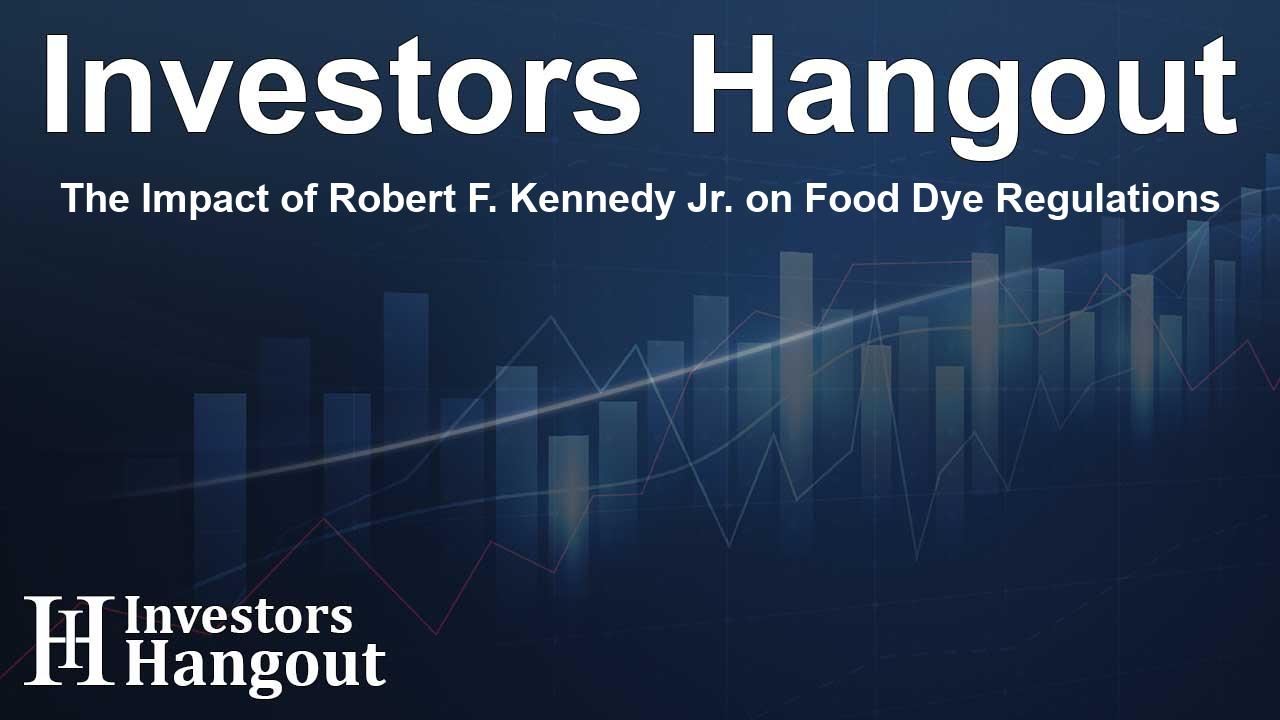The Impact of Robert F. Kennedy Jr. on Food Dye Regulations

Robert F. Kennedy Jr.'s Stand Against Artificial Food Dyes
Robert F. Kennedy Jr. has emerged as a prominent critic of artificial food dyes, attributing them to the ongoing health crises affecting the population. His bold stance could result in pivotal changes within the U.S. food sector. As he positions himself within the incoming administration, the spotlight is on how his philosophy will shape food policy.
Kennedy's Proposed Leadership at HHS
Recently, President-elect Donald Trump announced Kennedy as his choice for the head of the Department of Health and Human Services (HHS). This key role puts Kennedy in charge of the Food and Drug Administration, among other agencies, providing him a platform to potentially implement radical policy shifts. His views often contradict widely accepted public health protocols, such as those favoring water fluoridation and vaccination programs.
Condemnation of Chemical Additives in Foods
Kennedy has been particularly vocal about the prevalence of artificial additives in everyday items like cereals and snacks. He points to the fact that certain dyes, such as Red Dye No. 3, are already banned in many parts of the world, including Europe and California, due to serious health concerns.
Public Statements and Advocacy
During a recent rally, Kennedy expressed his deep concerns: "We are betraying our children by allowing these companies to poison them with unhealthy additives." This statement highlights his commitment to protecting kids’ health, especially concerning popular breakfast items.
Breakfast Cereals Under Scrutiny
For Kennedy, cereals are a focal point because of their widespread appeal to children. He firmly believes that colorful cereals like Froot Loops, while visually appealing, pose serious health risks due to their artificial coloring agents. His remarks to major media outlets have stirred discussions about the responsibilities of food manufacturers.
Corporate Reactions to Kennedy's Views
Kellogg, the company behind Froot Loops, has previously pledged to eliminate artificial colors and flavors from their products by a set deadline, though current offerings still contain these questionable ingredients. In a statement made in 2015, Kellogg acknowledged the mounting pressure to comply with health-conscious directives.
The Potential for Industry Shake-Up
Kennedy’s anticipated influence over the HHS has not gone unnoticed by food giants like General Mills, Inc. They expressed their readiness to engage with decision-makers regarding the evolving stance on food product regulations. This paints a picture of an industry poised for possible transformation as Kennedy amplifies discussions on food safety.
A Vision for Health Policy Reform
Trump is supportive of Kennedy's initiative to overhaul health policies, stating that he would allow Kennedy latitude to make sweeping changes. Emphasizing a commitment to change, he tasked Kennedy with the ambitious goal of tackling the chronic disease epidemic present in America today.
The Bigger Picture
The discussions surrounding food additives and public health highlight a broader concern about industrial food practices and corporate accountability. Kennedy's perspective welcomes a dialogue about what's really happening behind the scenes regarding food safety and nutrition.
Frequently Asked Questions
What role might Robert F. Kennedy Jr. play as the head of HHS?
If confirmed, he could lead significant reforms in food safety regulations, particularly regarding artificial food dyes.
Why are artificial food dyes controversial?
Many believe that these dyes can have harmful effects, particularly on children's health, prompting calls for stricter regulations.
What are companies like General Mills doing in response?
They are actively engaging with the government to align policies with consumer health initiatives, emphasizing their commitment to food safety.
How has Kennedy's stance affected public perception of cereal brands?
His remarks have raised awareness of artificial ingredients and could influence consumer choices towards healthier options.
What are the implications for food producers?
Changes in regulations could lead to reformulations of popular products, affecting product lines and marketing strategies across the industry.
About Investors Hangout
Investors Hangout is a leading online stock forum for financial discussion and learning, offering a wide range of free tools and resources. It draws in traders of all levels, who exchange market knowledge, investigate trading tactics, and keep an eye on industry developments in real time. Featuring financial articles, stock message boards, quotes, charts, company profiles, and live news updates. Through cooperative learning and a wealth of informational resources, it helps users from novices creating their first portfolios to experts honing their techniques. Join Investors Hangout today: https://investorshangout.com/
Disclaimer: The content of this article is solely for general informational purposes only; it does not represent legal, financial, or investment advice. Investors Hangout does not offer financial advice; the author is not a licensed financial advisor. Consult a qualified advisor before making any financial or investment decisions based on this article. The author's interpretation of publicly available data shapes the opinions presented here; as a result, they should not be taken as advice to purchase, sell, or hold any securities mentioned or any other investments. The author does not guarantee the accuracy, completeness, or timeliness of any material, providing it "as is." Information and market conditions may change; past performance is not indicative of future outcomes. If any of the material offered here is inaccurate, please contact us for corrections.